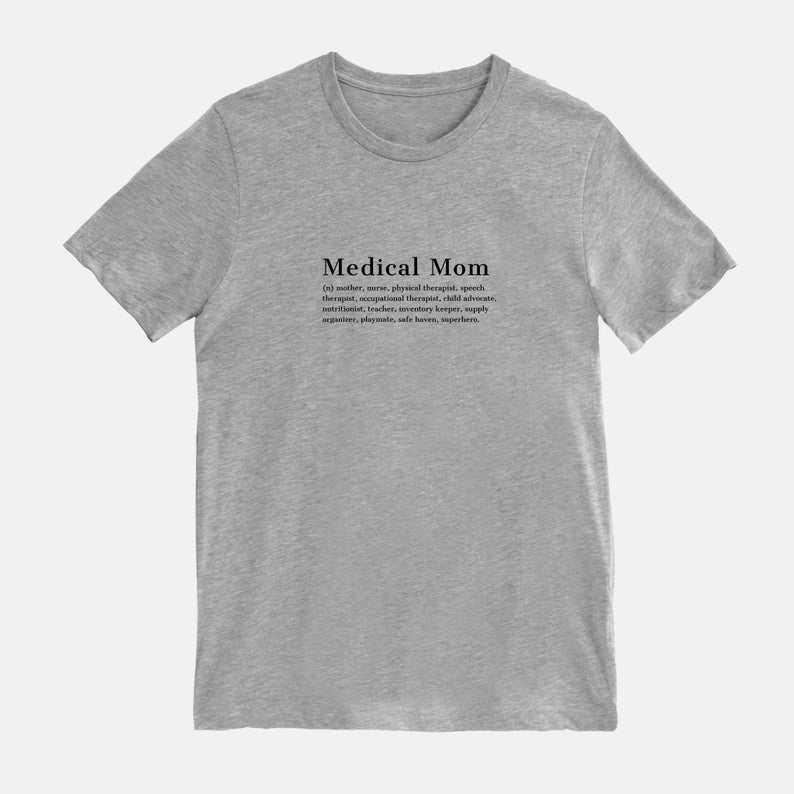medically fragile meaning
Many children live with medical complexities but some are classified as medically fragile meaning they have a condition that requires daily skilled nursing care.
The medically complex definition has significant implications for the daily life of the child, but also the entire family, particularly the child’s primary caregiver, who is often the medical mom.

*This post contains affiliate links. Please see full disclosure policy below.
When it comes to understanding the meaning of being medically fragile, it can be difficult to put into words. A medically fragile child is one who has a chronic medical condition that requires special care and attention. This can include physical, mental, or developmental disabilities, as well as chronic illnesses.
For the child’s family, especially a medical mom, this can mean a lot of extra time, energy, and financial resources to care for their fragile child. It can also mean a lot of emotional stress and worry, as they try to ensure their child is getting the best care possible.
What Does it Mean to be Medically Fragile?
Being a medically fragile child means having a medical condition that requires special care and attention. It can be a physical, mental, or emotional condition that requires extra medical attention and support.
Caring for this child can be a difficult and time-consuming job. Caregivers, such as Medical moms, must be constantly aware of the child’s needs and be prepared to provide the necessary medical attention. The child’s family must also be prepared to handle the financial burden of caring for a medically fragile child. This can include medical bills, medications, and other costs associated with the child’s care.
Additionally, the caregivers and family must be prepared to handle the emotional and psychological impact of caring for a medically fragile child. This can include dealing with the stress of managing the child’s medical needs, as well as the emotional toll of seeing the child suffer. All of these factors can take a toll on the medical mom, making it a difficult and often overwhelming job.
Financial Impact of Caring for a Medically Fragile Child
Caring for a medically fragile child can be an expensive endeavor. For the family, this means a lot of time and money spent on medical care, treatments, and therapies. It also means a lot of emotional stress and worry for the family. The financial impact of caring for a medically fragile child can be significant.
Medical bills and the costs of medications and treatments can add up quickly. In addition, there may be costs associated with special equipment, home modifications, and transportation. For many families, these costs can be overwhelming. It is important to remember that there are resources available to help families manage the financial burden of caring for a medically fragile child.

Emotional Impact of Caring for a Medically Fragile Child
Caring for a medically fragile child can be an emotionally taxing experience for the entire family. For the caregivers, like a medical mom, this often means long hours of care, frequent doctor visits, and a lot of stress.
The financial, emotional, and time impact of caring for a medically fragile child can be overwhelming. Caregivers often finds themselves in a difficult position, having to balance the needs of the medically fragile child with the needs of the rest of the family.
This can lead to feelings of guilt, exhaustion, and frustration. It can also be difficult to find the time and energy to take care of oneself. It is important for medical moms to take time for self-care and to reach out for support from family and friends. With the right support, medical moms can find the strength to face the challenges of caring for a medically fragile child.
Time Impact of Caring for a Medically Fragile Child
Caring for a medically fragile child can be an incredibly time-consuming endeavor. A medically fragile child is defined as a child with a chronic medical condition that requires frequent medical care and monitoring. This can include conditions such as cerebral palsy, cystic fibrosis, and muscular dystrophy.
For a parent or other caregiver, this often means long hours spent in the hospital, doctor’s offices, and therapy sessions. It also means having to juggle multiple appointments and medications, as well as providing round-the-clock care for their child. This can be an emotionally and financially draining experience, but it can also be incredibly rewarding.
The time spent caring for a medically fragile child can be a source of strength and joy for the entire family.
Tips for Supporting a Medically Fragile Child and Family
When it comes to understanding the life of a family with a medically fragile child, it is important to recognize the physical, emotional, and financial impact that a medically fragile child and their family can experience.
Supporting a medically fragile child and their family can be a difficult task, but it is important to remember that there are ways you can help like:
- providing emotional support
- helping with medical costs
- helping with basic expenses
- transportation
- respite care
Being a medically fragile child can be a difficult and challenging experience for both the child and their family. It requires a great deal of financial, emotional, and time commitment to provide the necessary care and support.
By understanding what it means to have a medically fragile child and the impact it can have on a family, we can better support and empower those who are caring for a medically fragile child.
FAQ and Answers
What is the definition of medically fragile?
A: Medically fragile is a term used to describe a child who has a chronic medical condition that requires ongoing medical care and monitoring. These conditions can range from physical disabilities to mental health issues, and can require frequent hospital visits, medications, and specialized treatments.
What are some common medical conditions that can make a child medically fragile?
A: Common medical conditions that can make a child medically fragile include cerebral palsy, muscular dystrophy, cystic fibrosis, and epilepsy.
What is the financial impact of caring for a medically fragile child?
A: The financial impact of caring for a medically fragile child can be significant. Medical costs, including hospital visits, medications, and specialized treatments, can add up quickly. In addition, families may need to make modifications to their home or purchase specialized equipment to accommodate their child’s needs.
What is the emotional impact of caring for a medically fragile child?
A: Caring for a medically fragile child can be emotionally taxing. Parents may experience feelings of guilt, fear, and sadness as they navigate their child’s medical condition. It is important for parents to find support systems and resources to help them cope with the emotional impact of caring for a medically fragile child.
What is the time impact of caring for a medically fragile child?
A: Caring for a medically fragile child can be time consuming. Parents may need to take time off work to attend medical appointments, administer medications, and provide care for their child. In addition, parents may need to adjust their daily routines to accommodate their child’s needs.
What tips can you provide for supporting a medically fragile child and family?
A: Supporting a medically fragile child and family can be challenging, but there are some tips that can help. Offer to help with tasks such as grocery shopping, meal preparation, and childcare.
Show your support by attending medical appointments and offering emotional support. Finally, provide resources and information to help the family navigate their child’s condition.
More posts for Medical Moms
Being a medical mom is a unique and challenging role. It requires a special kind of strength and resilience to care for a medically fragile child. The medical mom is the one who is responsible for the day-to-day care of the medically fragile child. This can be a daunting task, as it requires a great deal of time, energy, and financial resources.
It also requires a great deal of emotional strength and resilience to handle the daily challenges that come with caring for a medically fragile child.
Caregivers must be able to provide the necessary medical care and support while also providing emotional support and understanding. It is a difficult job, but one that is incredibly rewarding.
- Gifts for Medical Moms
- What is Medically Fragile Foster Care
- Medically Complex Child Quotes
- Fostering Medically Fragile Infants




